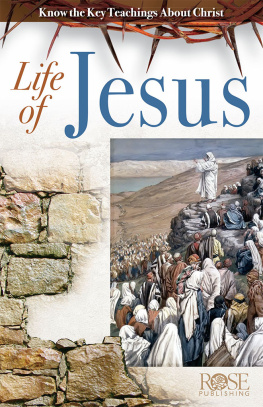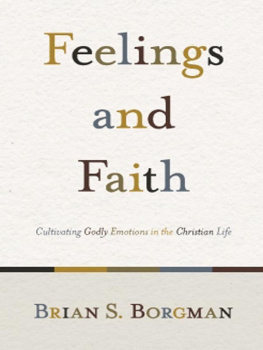Table of Contents
Landmarks
The Emotional
Life of
Our Lord

It belongs to the truth of our Lords humanity that he was subject to all sinless human emotions. In the accounts that the Evangelists give us of the crowded activities that filled the few years of his ministry, the play of a great variety of emotions is depicted. It has nevertheless not proved easy to form a universally acceptable conception of our Lords emotional life. Not only has the mystery of the incarnation entered in as a disturbing factor, the effect of the divine nature on the movements of the human soul brought into personal union with it has been variously estimated. Differences have arisen also as to how far there may be attributed to a perfect human nature movements known to us only as passions of sinful beings.
Two opposite tendencies early showed themselves in the church. One, derived ultimately from the ethical ideal of the Stoa, which conceived moral perfection under the form of apatheia , naturally wished to attribute this ideal apatheia to Jesus , as the perfect man. The other, under the influence of the conviction that, in order to deliver men from their weaknesses, the Redeemer must assume and sanctify in his own person all human patha , as naturally was eager to attribute to him in its fullness every human pathos . Though in far less clearly defined forms, and with a complete shifting of their bases, both tendencies are still operative in mens thought of Jesus . There is a tendency in the interest of the dignity of his person to minimize, and there is a tendency in the interest of the completeness of his humanity to magnify, his affectional movements. The one tendency may run some risk of giving us a somewhat cold and remote Jesus , whom we can scarcely believe to be able to sympathize with us in all our infirmities. The other may possibly be in danger of offering us a Jesus so crassly human as scarcely to command our highest reverence. Between the two, the figure of Jesus is liable to take on a certain vagueness of outline, and come to lack definiteness in our thought. It may not be without its uses, therefore, to seek a starting point for our conception of his emotional life in the comparatively few affectional movements that are directly assigned to him in the Gospel narratives. Proceeding outward from these, we may be able to form a more distinctly conceived and firmly grounded idea of his emotional life in general.
It cannot be assumed beforehand, indeed, that all the emotions attributed to Jesus in the Evangelical narratives are intended to be ascribed distinctively to his human soul. Such is no doubt the common view. And it is not an unnatural view to take as we currently read narratives, which, whatever else they contain, certainly present some dramatization of the human experiences of our Lord. No doubt, the naturalness of this view is its sufficient general justification. Only, it will be well to bear in mind that Jesus was definitely conceived by the Evangelists as a two-natured person, and that they made no difficulties with his duplex consciousness. In almost the same breath, they represent him as declaring that he knows the Father through and through and, of course, also all that is in man, and the world that is the theater of his activities, and that he is ignorant of the time of the occurrence of a simple earthly event that concerns his own work very closely; that he is meek and lowly in heart and yet at the same time the Lord of men by their relations to whom their destinies are determinedno man cometh unto the Father, but by me (John 14:6). In the case of a Being whose subjective life is depicted as focusing in two centers of consciousness, we may properly maintain some reserve in ascribing distinctively to one or the other of them mental activities that, so far as their nature is concerned, might properly belong to either. The embarrassment in studying the emotional life of Jesus arising from this cause, however, is more theoretical than practical. Some of the emotions attributed to him in the Evangelical narratives are, in one way or another, expressly assigned to his human soul. Some of them, by their very nature, assign themselves to his human soul. With reference to the remainder, just because they might equally well be assigned to the one nature or the other, it may be taken for granted that they belong to the human soul, if not exclusively, yet along with the divine Spirit; and they may, therefore, very properly be used to fill out the picture. We may thus, without serious danger of confusion, go simply to the Evangelical narratives, and, passing in review the definite ascriptions of specific emotions to Jesus in their records, found on them a conception of his emotional life that may serve as a starting point for a study of this aspect of our Lords human manifestation.
The establishment of this starting point is the single task of this essay. No attempt will be made in it to round out our view of our Lords emotional life. It will content itself with an attempt to ascertain the exact emotions that are expressly assigned to him in the Evangelical narratives, and will leave their mere collocation to convey its own lesson. We deceive ourselves, however, if their mere collocation does not suffice solidly to ground certain very clear convictions as to our Lords humanity, and to determine the lines on which our conception of the quality of his human nature must be filled out.
I
The emotion that we should naturally expect to find most frequently attributed to that Jesus whose whole life was a mission of mercy, and whose ministry was so marked by deeds of beneficence that it was summed up in the memory of his followers as a going through the land doing good (Acts 10:38 ), is no doubt compassion. In point of fact, this is the emotion that is most frequently attributed to him. The term employed to express it was unknown to the Greek classics and was perhaps a coinage of the Jewish dispersion. It first appears in common use in this sense, indeed, in the Synoptic Gospels, where it takes the place of the most inward classical word of this connotation. The divine mercy has been defined as that essential perfection in God whereby he pities and relieves the miseries of his creatures: it includes, that is to say, the two parts of an internal movement of pity and an external act of beneficence. It is the internal movement of pity that is emphasized when our Lord is said to be moved with compassion as the term is sometimes excellently rendered in the English versions. In the appeals made to his mercy, a more external word is used; but it is this more internal word that is employed to express our Lords response to these appeals: the petitioners besought him to take pity on them; his heart responded with a profound feeling of pity for them. His compassion fulfilled itself in the outward act; but what is emphasized by the term employed to express our Lords response is, in accordance with its very derivation, the profound internal movement of his emotional nature.
This emotional movement was aroused in our Lord as well by the sight of individual distress (Mark 1:41; Matt. 20:34; Luke 7:13) as by the spectacle of mans universal misery (Mark 6:34; 8:2; Matt. 9:36; 14:14; 15:32). The appeal of two blind men that their eyes might be opened (Matt. 20:34), the appeal of a leper for cleansing (Mark 1:41)though there may have been circumstances in his case that called out Jesus s reprobation (v. 43)set our Lords heart throbbing with pity, as did also the mere sight of a bereaved widow, wailing by the bier of her only son as they bore him forth to burial, though no appeal was made for relief (Luke 7:13). The ready spontaneity of Jesus s pity is even more plainly shown when he intervenes by a great miracle to relieve temporary pangs of hunger: I have compassion onor better, I feel pity forthe multitude, because they continue with me now three days, and have nothing to eat: and if I send them away fasting to their home, they will faint in the way; and some of them are come from far (Mark 8:23; Matt. 15:32)the only occasion on which Jesus is recorded as testifying to his own feeling of pity. It was not merely the physical ills of life, howeverwant and disease and deaththat called out our Lords compassion. These ills were rather looked upon by him as themselves rooted in spiritual destitution. And it was this spiritual destitution that most deeply moved his pity. The cause and the effects are indeed very closely linked together in the narrative, and it is not always easy to separate them. Thus, we read in Mark 6:34: And he came forth and saw a great multitude, and he had compassion on thembetter, he felt pity for thembecause they were as sheep not having a shepherd, and he taught them many things. But in the parallel passage in Matthew 14:14, we read: And he came forth and saw a great multitude, and he had compassion on [felt pity for] them, and he healed their sick. We must put the two passages together to get a complete account: their fatal ignorance of spiritual things, their evil case under the dominion of Satan in all the effects of his terrible tyranny, are alike the object of our Lords compassion. In another passage (Matt. 9:36), the emphasis is thrown very distinctly on the spiritual destitution of the people as the cause of his compassionate regard: But when he saw the multitude, he was moved with compassion for them, because they were distressed and scattered, as sheep not having a shepherd. This description of the spiritual destitution of the people is cast in very strong language. They are compared to sheep that have been worn out and torn by running hither and thither through the thorns with none to direct them, and have now fallen helpless and hopeless to the ground. The sight of their desperate plight awakens our Lords pity and moves him to provide the remedy.













